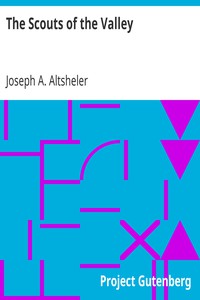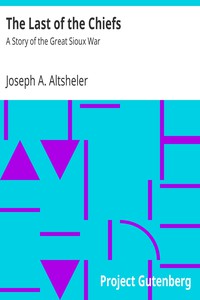The Scouts of the Valley by Joseph A. Altsheler (snow like ashes series .TXT) 📗

- Author: Joseph A. Altsheler
Book online «The Scouts of the Valley by Joseph A. Altsheler (snow like ashes series .TXT) 📗». Author Joseph A. Altsheler
“You are not wrong,” replied Henry. “They are alive, well and hungry, not a mile from here. There is one man whom they would be very glad to see, and his name is Cornelius Heemskerk, who is roaming in our woods without a permit.”
The round, ruddy face of the Dutchman glowed. It was obvious that he felt as much delight in seeing Henry as Henry felt in seeing him.
“My heart swells,” he said. “I feared that you might have been killed or scalped, or, at the best, have gone back to that far land of Kentucky.”
“We have wintered well,” said Henry, “in a place of which I shall not tell you now, and we are here to see the campaign through.”
“I come, too, for the same purpose,” said Heemskerk. “We shall be together. It is goot.” “Meanwhile,” said Henry, “our camp fire is lighted. Jim Hart, whom you have known of old, is cooking strips of meat over the coals, and, although it is a mile away, the odor of them is very pleasant in my nostrils. I wish to go back there, and it will be all the more delightful to me, and to those who wait, if I can bring with me such a welcome guest.”
“Lead on, mynheer,” said Cornelius Heemskerk sententiously.
He received an equally emphatic welcome from the others, and then they ate and talked. Heemskerk was sanguine.
“Something will be done this time,” he said. “Word has come from the great commander that the Iroquois must be crushed. The thousands who have fallen must be avenged, and this great fire along our border must be stopped. If it cannot be done, then we perish. We have old tales in my own country of the cruel deeds that the Spaniards did long, long ago, but they were not worse than have been done here.”
The five made no response, but the mind of every one of them traveled back to Wyoming and all that they had seen there, and the scars and traces of many more tragedies.
They reached the camp on Lake Otsego the next day, and Henry saw that all they had heard was true. The most formidable force that they had ever seen was gathering. There were many companies in the Continental buff and blue, epauletted officers, bayonets and cannon. The camp was full of life, energy, and hope, and the five at once felt the influence of it. They found here old friends whom they had known in the march on Oghwaga, William Gray, young Taylor, and others, and they were made very welcome. They were presented to General James Clinton, then in charge, received roving commissions as scouts and hunters, and with Heemskerk and the two celebrated borderers, Timothy Murphy and David Elerson, they roamed the forest in a great circle about the lake, bringing much valuable information about the movements of the enemy, who in their turn were gathering in force, while the royal authorities were dispatching both Indians and white men from Canada to help them.
These great scouting expeditions saved the five from much impatience. It takes a long time for an army to gather and then to equip itself for the march, and they were so used to swift motion that it was now a part of their nature. At last the army was ready, and it left the lake. Then it proceeded in boats down the Tioga flooded to a sufficient depth by an artificial dam built with immense labor, to its confluence with the larger river. Here were more men, and the five saw a new commander, General James Sullivan, take charge of the united force. Then the army, late in August, began its march upon the Iroquois.
The five were now in the van, miles ahead of the main guard. They knew that no important movement of so large a force could escape the notice of the enemy, but they, with other scouts, made it their duty to see that the Americans marched into no trap.
It was now the waning summer. The leaves were lightly touched with brown, and the grass had begun to wither. Berries were ripening on the vines, and the quantity of game had increased, the wild animals returning to the land from which civilized man had disappeared. The desolation seemed even more complete than in the autumn before. In the winter and spring the Iroquois and Tories had destroyed the few remnants of houses that were left. Braxton Wyatt and his band had been particularly active in this work, and many tales had come of his cruelty and that of his swart Tory lieutenant, Coleman. Henry was sure, too, that Wyatt's band, which numbered perhaps fifty Indians and Tories, was now in front of them.
He, his comrades, Heemskerk, Elerson, Murphy, and four others, twelve brave forest runners all told, went into camp one night about ten miles ahead of the army. They lighted no fire, and, even had it been cold, they would not have done so, as the region was far too dangerous for any light. Yet the little band felt no fear. They were only twelve, it is true, but such a twelve! No chance would either Indians or Tories have to surprise them.
They merely lay down in the thick brushwood, three intending to keep watch while the others slept. Henry, Shif'less Sol, and Heemskerk were the sentinels. It was very late, nearly midnight; the sky was clear, and presently they saw smoke rings ascending from high hills to their right, to be answered soon by other rings of smoke to their left. The three watched them with but little comment, and read every signal in turn. They said: “The enemy is still advancing,” “He is too strong for us...... We must retreat and await our brethren.”
“It means that there will be no battle to-morrow, at least,” whispered Heemskerk. “Brant is probably ahead of us in command, and he will avoid us until he receives the fresh forces from Canada.”
“I take it that you're right,” Henry whispered back. “Timmendiquas also is with him, and the two great chiefs are too cunning to fight until they can bring their last man into action.”
“An' then,” said the shiftless one, “we'll see what happens.”
“Yes,” said Henry very gravely, “we'll see what happens. The Iroquois are a powerful confederacy. They've ruled in these woods for hundreds of years. They're led by great chiefs, and they're helped by our white enemies. You can't tell what would happen even to an army like ours in an ambush.”
Shif'less Sol nodded, and they said no more until an hour later, when they heard footsteps. They awakened the others, and the twelve, crawling to the edge of the brushwood, lay almost flat upon their faces, with their hands upon the triggers of their rifles.
Braxton Wyatt and his band of nearly threescore, Indians and Tories in about equal numbers, were passing. Wyatt walked at the head. Despite his youth, he had acquired an air of command, and he seemed a fit leader for such a crew. He wore a faded royal uniform, and, while a small sword hung at his side, he also carried a rifle on his shoulder. Close behind him was the swart and squat Tory, Coleman, and then came Indians and Tories together.
The watchful eyes of Henry saw three fresh scalps hanging from as many belts, and the finger that lay upon the trigger of his rifle fairly ached to press it. What an opportunity this would be if the twelve were only





Comments (0)